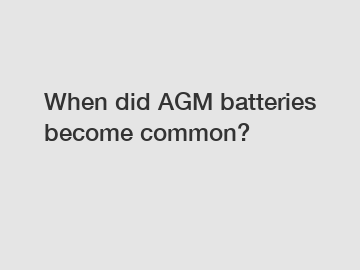When did AGM batteries become common?
When did AGM batteries become common? AGM batteries, also known as Absorbent Glass Mat batteries, became common in the early 1980s. During that time, they were primarily used in military and aviation applications due to their unique characteristics. However, it wasn't until the late 1990s and early 2000s that AGM batteries started to gain popularity and became widely adopted in various industries, such as automotive, marine, and renewable energy.
The rise in popularity of AGM batteries can be attributed to several factors. Firstly, AGM batteries offer numerous advantages over traditional lead-acid batteries. They are maintenance-free, meaning they do not require regular checking of the electrolyte levels or topping up with distilled water. This convenience factor has made AGM batteries particularly attractive to consumers.
Secondly, AGM batteries have a superior ability to withstand deep discharges. They are designed to handle extreme cycling, making them suitable for applications that require frequent and deep battery cycling. This characteristic makes AGM batteries ideal for use in hybrid vehicles, off-grid solar systems, and other demanding applications.

Additionally, AGM batteries are known for their high power density and low internal resistance. This allows them to deliver a large amount of power quickly, making them suitable for applications with high power requirements, such as starting large engines or powering high-performance audio systems.
The environmental impact of AGM batteries is also a significant factor in their widespread adoption. Unlike traditional lead-acid batteries, AGM batteries are spill-proof and can be mounted in any position. This makes them safer and easier to handle, reducing the risk of accidents and environmental contamination. Furthermore, AGM batteries have a longer lifespan and a higher tolerance for temperature fluctuations, resulting in reduced waste and a lower carbon footprint.
The impact of AGM batteries becoming common has been far-reaching. In the automotive industry, AGM batteries have revolutionized the functionality of start-stop systems, which automatically shut off the engine when the vehicle is idling and restarts it when the driver resumes driving. This system helps reduce fuel consumption and emissions, leading to a more sustainable and environmentally friendly driving experience.
In the renewable energy sector, AGM batteries have played a crucial role in the advancement of off-grid systems and energy storage solutions. They have allowed for more efficient energy utilization and improved the reliability of renewable energy sources, making them an essential component in achieving a greener future.
In conclusion, AGM batteries became common in the early 1980s and have since gained popularity due to their convenience, durability, high power density, and environmental benefits. Their widespread adoption has had a significant impact on various industries, contributing to the development of more sustainable and efficient technologies. Whether it be in automotive, marine, or renewable energy applications, AGM batteries have proven to be a reliable and versatile power source.
Contact us to discuss your requirements of what can drain a car battery, heavy duty car battery, caml battery price. Our experienced sales team can help you identify the options that best suit your needs.


